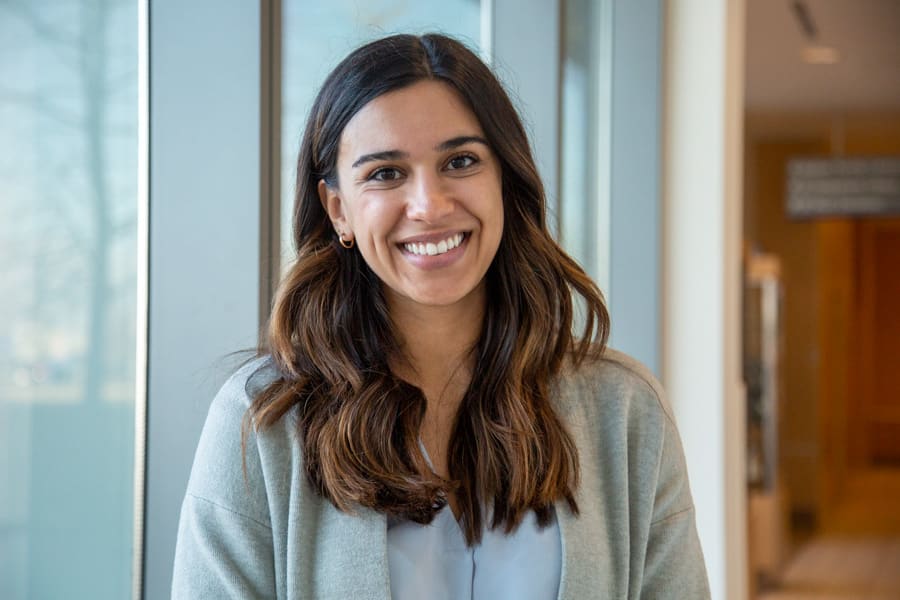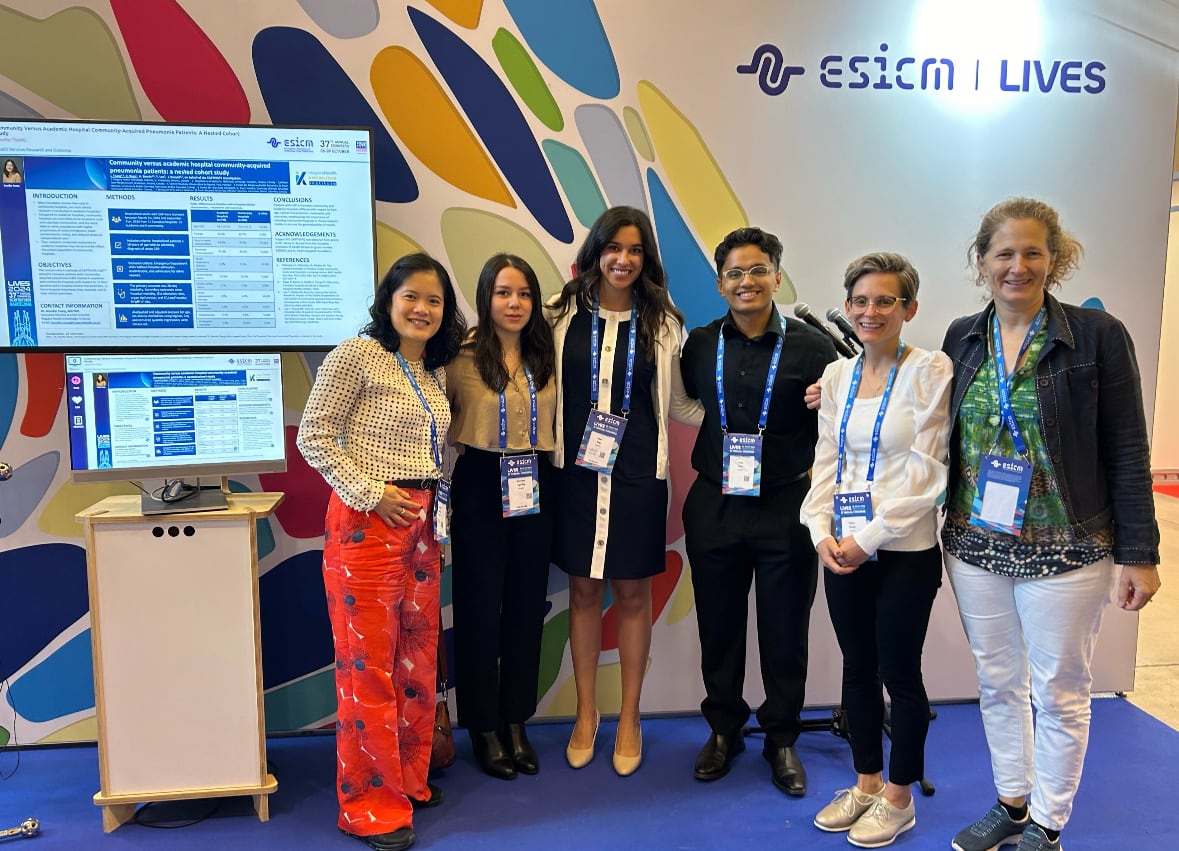The research we conduct at Niagara Health has a profound impact on the health and well-being of our patients and communities, and contributes to better understanding some of the most significant healthcare challenges of our time with the potential to benefit patients in Niagara and across Canada.

Prey Patel's volunteer work with the Niagara Health Knowledge Institute has inspired him to combine a career that includes practising medicine and research.
Prey Patel always knew he wanted to be a doctor. But it wasn’t until he volunteered with the Niagara Health Knowledge Institute (NHKI) that he realized research could be part of that ambition.
Now a medical student at Queen’s University, Patel has already had opportunities as a research visitor in the NHKI’s experiential learning research program that most of his peers won’t see until they’re established in their careers. That includes being a co-author on a paper and presenting at international conferences.
He wants to keep that momentum going. Patel’s goal is to combine research with patient care when he graduates medical school. And he wants to do it in the hospital and community that first opened the door for him.
“I wasn’t involved in research during my undergrad until I came to Niagara Health because I never felt it was overly impactful to our community,” Patel says. “But the work they’re doing in the NHKI felt ingrained in patient care and I could see the importance of the research they were doing. I felt it impacted the community I cherished, and being from Welland, I’d like to come back and practise there.”
Research visitors are typically students, recent graduates or those new to the field of health research. As part of the experiential learning research program, they work alongside research staff and a principal investigator at Niagara Health, performing hands-on tasks that include reviewing literature, collecting and analyzing data, interacting with study participants, and disseminating findings.
It’s all in keeping with the NHKI’s mandate of transforming healthcare by generating knowledge, putting it into practice, and training the next generation of health researchers.
In the process, research visitors also build capacity at the NHKI, explains Research Co-ordinator Kian Rego, who oversees the program.
“Having students like Prey is beneficial because it not only provides our team with extra support on projects, but we’re also planning for the sustainability of the NHKI,” Rego says. “These are often local students and they’re gaining exposure to the career opportunities that exist right here in Niagara.”

Kian Rego, NHKI Research Co-ordinator.
Seeing the impact of research beyond academic centres
Rego is proof the NHKI’s approach to nurturing future researchers works in recruiting staff. She started at Niagara Health as a volunteer, then joined the NHKI as a research student, where she learned how diverse health research can be and how it directly affects patient care and broader policies. She’s since worked her way up to a full-time position as a research co-ordinator.
Before Rego arrived at Niagara Health, she hadn’t considered a career in health research. The very idea of it conjured images of people “wearing a white coat and working in a lab.” But while studying at Brock University, she met Prof. Madelyn Law, currently on secondment to Niagara Health as Director of Quality, Patient Safety and Risk, and Dr. Jennifer Tsang, NHKI Executive Director and Chief Scientist. They became co-supervisors for Rego’s master’s thesis about strengthening research culture in Canadian community hospitals.
“Their mentorship opened my eyes to the field of health services research, which involves interviewing people about their perspectives on how to solve complex problems within the healthcare system and generating solutions for process improvement. I hadn’t thought about that before,” she recalls. “It was an area that excited me and it completely pivoted by career aspirations.”
Patel’s first stint as a student researcher at Niagara Health was during the summer between his third and fourth year studying health sciences at McMaster University. He assisted with a scoping review of research activity in Ontario community hospitals.
It proved a turning point for him, showing him the potential impact of health research in Niagara and other communities beyond major academic centres.

Niagara Health Knowledge Institute researchers and trainees at the European Society of Intensive Care Medicine (ESICM) Congress in Barcelona, Spain. From left: Dr. Jennifer Tsang, NHKI Executive Director and Chief Scientist; Vanessa Gyorffy, 2023 NHKI summer student; Kian Rego, Research Co-ordinator; Prey Patel, NHKI volunteer researcher; Elaina Orlando, NHKI Research Manager; and Dr. Alexandra Binnie, an Intensivist from William Osler Health System in Toronto.
A world of opportunity
His involvement blossomed into a long-term relationship when Dr. Tsang offered to supervise his honours thesis on the topic in his fourth year. His research became part of a manuscript later accepted for publication in BMC Health Services Research with Patel as second author.
“That shows they really value the work I put in,” he says. “Kian and (former research assistant) Jane (Jomy) were very supportive, guiding me step by step. That helped me take risks with my writing and grow in the role.”
Patel stayed on as a research visitor during his thesis year and returned full-time last summer before heading to Queen’s. During that time, he worked on an environmental scan in support of single-patient hospital rooms and expanded his review of community hospital research activities to include all of Canada. He presented those nationwide findings at the Canadian Critical Care Canada Forum and Canadian Community ICU Research Network (CCIRNet) conferences in Toronto last November.
He and Rego recently co-authored another manuscript community hospital research activity throughout Canada that’s being considered for publication.
Patel also presented a poster on behalf of the NHKI team last fall at the European Society of Intensive Care Medicine (ESICM) Congress in Barcelona, Spain.
Now in Kingston, Patel continues to help the NHKI team remotely and plans to return in the summer to volunteer in person.
He comes back for the potential impact of the work he and the NHKI do but he stays as much for the supportive environment. Even during his medical school application process, Dr. Tsang and Rego helped him prepare for interviews, something he says he deeply appreciated.
“The team has supported me throughout my journey, regardless of whether a project I was working on helped on their end,” Patel says. “Regardless of the distance, they’ve never stopped giving me opportunities.”

